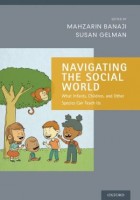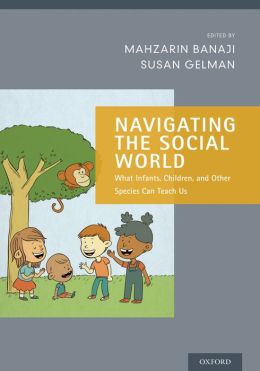 Authors: Mahzarin R. Banaji and Susan A. Gelman
Authors: Mahzarin R. Banaji and Susan A. Gelman
Publisher: Oxford University Press
Book Review by: Sonu Chandiram
The past decade has been marked by tremendous energy and an outpouring of research on humans as social beings, the authors point out at the outset of this book.
They write that we become social beings from the moment we are born, first surrounded by our parents and siblings, then by people we meet outside the home, in school and in other settings.
“The development of ‘social cognition’ is among the most fundamental aspects of the mind that must be understood,” Banaji and Gelman declare.
Essentially, Navigating the Social World presents a concise set of points of view about the development of minds in a social context written by leading social and developmental psychologists. The authors state that there is much social cognition than we may have realized, at birth and in our early years. Towards this contention, they
• Make astute observations
• Reveal surprising discoveries
• Present evidence
Among the aspects of our social lives this book examines are:
• Social cognition from infancy into adolescence, with a focus on our first decade of life
• The psychological foundations laid by the study of mentalizing, or the mystery of how we come to understand the minds of others
• The role of others in the development of imitation, sharing, and communication
• The role of social learning in the acquisition of language, interpersonal skills, understanding causality, statistical evidence, food, and friendship
• How children understand early in life that individuals are also members of social groups such as collectives and coalitions
• How social categories provide information about essentialism in cementing categories
• How infants detect group differences via faces
• How experiences modulate social cognitive abilities to perceive and generalize from gender, race/ethnicity and language/accent.
• Views on the general tendency of children to profligately, their active engagement in questions of morality, and their cross-cultural variations on it.
• The development of personality in the form of helping, altruism, and cooperation.
Mahzarin R. Banaji is Richard Clarke Cabot Professor of Social Ethics in the Department of Psychology at Harvard University. Banaji studies the social beliefs and preferences of adults and children with a focus on implicit or automatic cognition.
She taught at Yale University for 15 years, receiving the Lex Hixon Prize for Teaching Excellence and served as the first Carol K. Pforzheimer Professor at the Radcliffe Institute for Advanced Study.
At present, Banaji also serves as Cowan Chair in Human Social Dynamics at the Santa Fe Institute. Banaji is the recipient of a J. S. Guggenheim Fellowship, and the Diener Award for Outstanding Contributions to Social Psychology. She was elected fellow of the American Association for the Advancement of Science, the Society of Experimental Psychologists, the American Academy for Arts and Science and Herbert Simon Fellow of the Association for Social and Political Psychology.
Her work has been recognized with a Presidential Citation from the American Psychological Association and she served as President of the Association for Psychological Science. Banaji has published over 180 scholarly papers and most recently a book (with Anthony Greenwald), Blindspot: Hidden Biases of Good People.
Susan A. Gelman teaches at the University of Michigan, Ann Arbor, where she is the Heinz Werner Collegiate Professor of Psychology. Gelman’s research focuses on concept and language development in young children. She is the author of over 200 scholarly publications, including The Essential Child (Oxford University Press, 2003), which received the Cognitive Development Society Book Award and the Eleanor Maccoby Book Prize from the American Psychological Association.
Gelman is a fellow of the American Academy of Arts and Sciences, the Association for Psychological Science, the American Psychological Association (Division 7), and the Cognitive Science Society.
She has received numerous awards, including a J. S. Guggenheim Fellowship, a James McKeen Cattell Fund sabbatical fellowship, the American Psychological Association Distinguished Scientific Award for Early Career Contribution to Psychology in the Developmental Area, and the Developmental Psychology Mentor Award of Division 7, American Psychological Association. Gelman was elected to the National Academy of Sciences in 2012.







